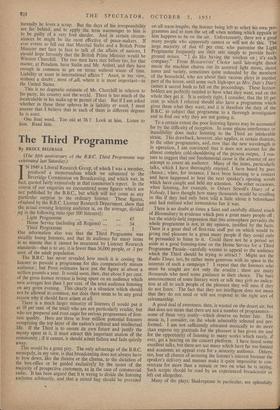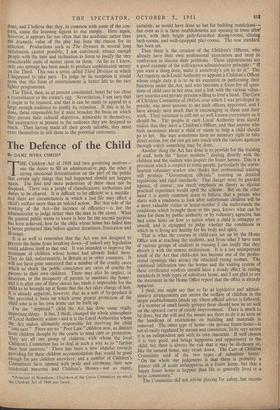The Third Programme
By BRUCE BELFRAGE
(The fifth anniversary of the B.B.C. Third Programme was celebrated last Saturday.) IN 1949 a Liberal Research Group, of which I was a member, produced a memorandum which we submitted to the Beveridge Commission on Broadcasting, and which was, in fact, quoted fairly extensively in that committee's report. In the course of our enquiries we encountered some figures which are not published by the B.B.C., but which will not come as any particular surprise to the ordinary listener. These figures, obtained by the B.B.C. Listener Research Department, show that the actual evening listening audience is, on the average, divided iup in the following ratio per 100 listeners): Light Programme ... ... ... ... 65 ' Home Service (including all Regions) ... ... 34 Third Programme ,.. •.• ••• .•• 1 Our information also was that the Third Programme was steadily losing listeners, and that its audience for many items is so minute that it cannot be measured by Listener Research standards—that is to say, it is fewer than 36,000 people, or .1 per cent. of the adult population.
The B.B.C. has never revealed how much it is costing the listener to provide a programme for this comparatively minute audience ; but Press estimates have put the figure at about a million pounds a year. It would seem, then, that about 8 per cent. of the gross licence revenue is being spent on an audience which now averages less than 1 per cent. of the total audience listening on any given evening. This clearly is a situation which should not be allowed to continue, nor does there seem to be any good reason why it should have arisen at all.
There is a much larger minority of listeners (I would put it at 10 per cent. of the total) who are not particularly erudite, but who are prepared and even eager for serious programmes of first- rate quality. Here are three to four million potential listeners comprising the top layer of the nation's cultural and intellectual life. If the Third is to ensure its own future and justify the money spent in it, it must attract this important section of the community ; if it cannot, it should admit failure and fade quietly away.
This would be a great pity. The only advantage of the B.B.C. monopoly, in my view, is that broadcasting does not always have to bow down, like the theatre or the cinema, to the dictation of the box-office or be guided exclusively by the tastes of the majority of prospective customers, as in the case of commercial radio. It has been argued that it is wrong to divide the listening audience arbitrarily, and, that a mixed bag should be provided on all wave-lengths, the listener being left.to select his own pro- grammes and to turn the set off when nothing which appeals to him happens to be on the air. Unfortunately, there are a great many people who apparently cannot or will not do this. -rho large majority of that 65 per cent. who patronise the Light Programme frequently use their sets simply to provide back- ground noises. "I do like having the wireless on ; it's such company." From Housewives' Choice until late-night dance music the machine churns out its assorted light music, dance tunes and variety, sometimes quite unheeded by the members of the household, who are about their various ploys in another part of the house, until some such high-spot as Mrs. Dale's Diary, causes a sacred hush to fall on the proceedings. These licence- holders are perfectly entitled to have what they want, and on the whole they get it. It is entirely right, I consider, that the 10 per cent. to which I referred should also hare a programme which gives them what they want, and it is therefore the duty of the B.B.C. to subject that programme to a thorough investigation and to find out why they are not getting it.
To a certain extent the poor listening figures may be accounted for by the difficulty of reception. In some places interference or inaudibility does make listening to the Third an intolerable strain. This drawback, however, also applies, in certain districts, to the other programmes, and,_now that the new wavelength is in operation, I am convinced' that it does not account for the almost complete cold-shouldering of the present output. I ven- ture to suggest that one fundamental cause is the absence of any attempt to create an audience. Many of the items, particularly talks, which I have thoroughly enjoyed, I have heard by pure chance ; when, for instance, I have been listening to a concert and have happened to hear the next speaker's opening words which have caught and held my attention. On other occasions, when listening, for example, to Osbert Sitwell's Diary of a Nobody, I have thought how many thousands would be revelling in this if they had only been told a little about it beforehand and had realised what tremendous fun it was.
There is no doubt at times a faint and carefully diluted touch of Bloomsbury in evidence which puts a great many people off ; but the widely-held impression that this atmosphere pervades the whole programme is not, in my opinion, justified by the facts. There is a great deal of first-rate stuff put on which would be giving real pleasure to a great many people if they could only be persuaded to listen to it. Could there not be a period set aside at a good listening-time on the Home Service for a Third Programme Parade—carefully written to appeal to the audience which the Third should be trying to attract ? Might not the Radio Times, too, be rather more generous with its space in the interests of such a campaign ? I repeat that the listeners who must be sought are not only the erudite ; there are many thousands who need some guidance in their choice. The bare announcement of some literary work or talk may givb no indica- tion at all to such people of the pleasure they will miss if they do not listen. The fact that they are intelligent does not mean that they do not need or will not respond to the right sort of salesmanship.
A good deal of sweetness, then, is wasted on the desert air, but that does not mean that there are not a number of programmes— some of them very costly—which deserve no better fate. The music is, I consider, on the whole admirably selected and per- formed. I am not sufficiently educated musically to do more than express my gratitude for the pleasure it has given me and for the opportunity of listening to many works which rarely, if ever, get a hearing on the concert platform. I have heard some excellent talks, but there are too many which have far too limited and academic an appeal even for a minority audience. Others, too, lose all chance of arousing the listener's interest because the speaker's delivery and manner make it quite impossible to con- centrate for more than a minute or two on what he is saying. Such scripts should be read by an experienced broadcaster or left out altogether.
Many of the plays, Shakespeare in particular, are splendidly done, and I believe that they, in common with some of the con- certs, cause the listening figures to rise steeply. Here again, however, it appears far too often that the academic rather than the dramatic value of the play has been the reason for its selection. Productions such as The Dynasts in several long instalments cannot possibly, I am convinced, attract enough People with the time and inclination to listen to justify the very considerable sums of money spent on them. As far as I know, only one attempt has been made to produce sophisticated variety on the Third. This was a series called Third Division in which I happened to take part. To judge by its reception it would seem that this form of entertainment is better left to the two lighter programmes.
The Third, then, as at present constituted, bears far too close a resemblance. to the curate's egg. Nevertheless, I am sure that it ought to be retained, and that it can be made to appeal to a large enough audience to justify its retention. If this is to be done, those responsible for it must broaden the basis on which they pursue their cultural objectives, admirable in themselves, but unattractive at present to the audience they are designed to reach. Then having made all their goods saleable,, they must exert themselves to sell them to the potential customers.






















































 Previous page
Previous page